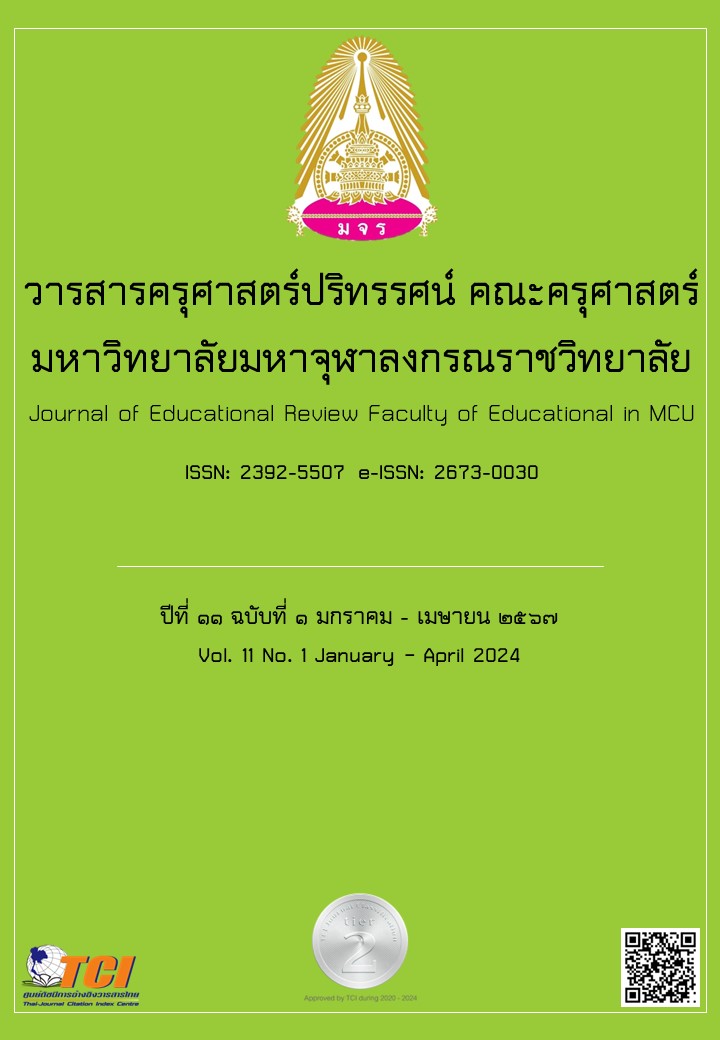THE EFFECTS OF EXPERIENCE BY USING THE CONCEPT OF MODELLING ON PUBLIC-MINDED BEHAVIORS OF YOUNG CHILDREN
Main Article Content
Abstract
The objective of this research article were to compare the public-minded behaviors of young children in pre-experiment and post-experiment by experience using the concept of modelling and to study the development of public-minded behaviors of young children in pre-experiment, experiment and post-experiment by experience using the concept of modelling. The target group consisted of 16 young children studying in kindergarden 3 in the 2nd semester of the academic year 2020 of Bannongsarai School, Nongprue District, Kanchanaburi province. Two types of instruments were: 1) the observation of public-minded behaviors form, with the content validity was 0.60-1.00, and the rater agreement index was 0.87 and 2) lesson plans by experience using the concept of modelling, with the index of consistency between lesson plans and objectives was 1.00 and efficiency value was 4.58. Comparing with the criteria, it was found that lesson plans by experience using the concept of modelling most effective. The research methodology used time series experimental design. There were 3 stages of observation including pre-experiment, during experiment and post-experiment. The statistics used for data analysis were mean, standard deviation and using line graphs for presenting the development of public-minded behaviors. The findings were as follows: 1) The public-minded behaviors of young children in post-experiment was higher than pre-experiment by experience using the concept of modelling. 2) The development of public-minded behaviors of young children in pre-experiment, during experiment and post-experiment by experience using the concept of modelling tended to be higher.
Article Details

This work is licensed under a Creative Commons Attribution-NonCommercial-NoDerivatives 4.0 International License.
ทัศนะและความคิดเห็นที่ปรากฏในบทความในวารสารฉบับนี้ถือเป็นความรับผิดชอบของผู้เขียนบทความนั้นเพียงผู้เดียว และไม่ถือเป็นทัศนะและความรับผิดชอบของกองบรรณาธิการ
กองบรรณาธิการขอสงวนสิทธิ์ในการคัดเลือกบทความลงตีพิมพ์และจะแจ้งให้เจ้าของบทความทราบหลังจากผู้ประเมินบทความตรวจอ่านบทความแล้ว
ต้นฉบับที่ได้รับการตีพิมพ์ในวารสารครุศาสตร์ปริทรรศน์ คณะครุศาสตร์ มหาวิทยาลัยมหาจุฬาลงกรณราชวิทยาลัย ถือเป็นกรรมสิทธิ์ของคณะครุศาสตร์ มหาวิทยาลัยมหาจุฬาลงกรณราชวิทยาลัย ห้ามนำข้อความทั้งหมดหรือบางส่วนไปพิมพ์ซ้ำ เว้นเสียแต่ว่าจะได้รับอนุญาตจากมหาวิทยาลัยฯ เป็นลายลักษณ์อักษร
References
กรรยา พรรณนา. (2559). จิตสาธารณะสร้างได้ง่ายนิดเดียว. กรุงเทพมหานคร: ศูนย์หนังสือจุฬาลงกรณ์มหาวิทยาลัย.
ชัยวัฒน์ สุทธิรัตน์. (2552). สอนเด็กให้มีจิตสาธารณะ. กรุงเทพมหานคร: ศูนย์หนังสือจุฬาลงกรณ์มหาวิทยาลัย.
นวลจันทร์ พะทำโล. (2558). การพัฒนาหลักสูตรฝึกอบรมครูเพื่อส่งเสริมพัฒนาการทางอารมณ์และสังคมของเด็กปฐมวัย. วารสารวิชาการศึกษาศาสตร์. 16(1). 77-78.
พิมพ์ชนก นุชเนตร. (2560). การสังเกตและพฤติกรรมการเลียนแบบจากรายการเซเลบบล็อก. การค้นคว้าอิสระนิเทศศาสตรมหาบัณฑิต. มหาวิทยาลัยกรุงเทพ.
รังรอง งามศิริ. (2560). เอกสารประกอบการสอน รายวิชาจิตวิทยาสำหรับครู. กาญจนบุรี: คณะครุศาสตร์ มหาวิทยาลัยราชภัฏกาญจนบุรี.
ศุภลักษณ์ บำรุงพันธ์. (2555). ผลการจัดประสบการณ์การเล่านิทานประกอบคำถามปลายเปิดที่มีผลต่อผลสัมฤทธิ์ทางการเรียนและความคิดสร้างสรรค์ของเด็กปฐมวัยชั้นอนุบาลปีที่ 2. วิทยานิพนธ์การศึกษามหาบัณฑิต. มหาวิทยาลัยมหาสารคาม.
สายทอง ธัญนายก. (2559). การจัดกิจกรรมการเล่านิทานโดยใช้หนังสือนิทานบทเรียนคอมพิวเตอร์มัลติมีเดียที่มีต่อพฤติกรรมด้านคุณธรรม จริยธรรมและการมีจิตใจที่ดีงามของเด็กชั้นอนุบาลปีที่ 3. วารสารศึกษาศาสตร์ มหาวิทยาลัยศิลปากร. 14(2). 74.


